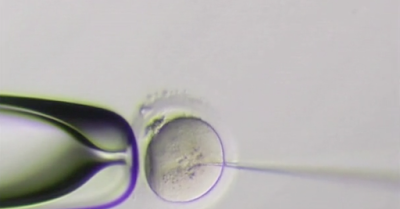It's only a matter of time... Note this kind of work can be done very secretly and with very modest resources -- it does not require banks of centrifuges, big reactors, or ICBM test launches.
First Human Embryos Edited in U.S. (MIT Technology Review)Work on cognitive enhancement will probably be done first in monkeys, proving Planet of the Apes prophetic within the next decade or so :-)
Researchers have demonstrated they can efficiently improve the DNA of human embryos.
The first known attempt at creating genetically modified human embryos in the United States has been carried out by a team of researchers in Portland, Oregon, MIT Technology Review has learned.
The effort, led by Shoukhrat Mitalipov of Oregon Health and Science University, involved changing the DNA of a large number of one-cell embryos with the gene-editing technique CRISPR, according to people familiar with the scientific results.
Until now, American scientists have watched with a combination of awe, envy, and some alarm as scientists elsewhere were first to explore the controversial practice. To date, three previous reports of editing human embryos were all published by scientists in China.
Now Mitalipov is believed to have broken new ground both in the number of embryos experimented upon and by demonstrating that it is possible to safely and efficiently correct defective genes that cause inherited diseases.
... Some critics say germline experiments could open the floodgates to a brave new world of “designer babies” engineered with genetic enhancements—a prospect bitterly opposed by a range of religious organizations, civil society groups, and biotech companies.
The U.S. intelligence community last year called CRISPR a potential "weapon of mass destruction.”
... Mitalipov and his colleagues are said to have convincingly shown that it is possible to avoid both mosaicism and “off-target” effects, as the CRISPR errors are known.
A person familiar with the research says “many tens” of human IVF embryos were created for the experiment using the donated sperm of men carrying inherited disease mutations.
His team’s move into embryo editing coincides with a report by the U.S. National Academy of Sciences in February that was widely seen as providing a green light for lab research on germline modification.
The report also offered qualified support for the use of CRISPR for making gene-edited babies, but only if it were deployed for the elimination of serious diseases.
The advisory committee drew a red line at genetic enhancements—like higher intelligence. “Genome editing to enhance traits or abilities beyond ordinary health raises concerns about whether the benefits can outweigh the risks, and about fairness if available only to some people,” said Alta Charo, co-chair of the NAS’s study committee and professor of law and bioethics at the University of Wisconsin–Madison.
In the U.S., any effort to turn an edited IVF embryo into a baby has been blocked by Congress, which added language to the Department of Health and Human Services funding bill forbidding it from approving clinical trials of the concept.
Despite such barriers, the creation of a gene-edited person could be attempted at any moment, including by IVF clinics operating facilities in countries where there are no such legal restrictions.


No comments:
Post a Comment